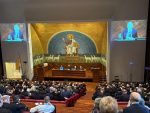Vatican City: Pope Francis is firing back at foes of his efforts to make the Catholic Church more open and pastoral in its ministry, telling an interviewer that “they are acting in bad faith to foment divisions.”
The pontiff’s lengthy interview in Avvenire, the official newspaper of the Italian hierarchy, was published Friday (Nov. 18) and followed days of news coverage of demands by four hard-line cardinals who have grave concerns about Francis’ approach.
The four say that focusing on ministering to people in their particular circumstances is eroding the church’s doctrinal absolutes and that Francis must dispel any ambiguities or face serious consequences.
The four critics, led by U.S. Cardinal Raymond Burke, a Rome-based prelate and longtime opponent of the pontiff’s policies, had written privately to Francis in September.
They asked the pontiff to state whether passages in a landmark document on ministering to families that he had issued in April could be interpreted to allow divorced and remarried Catholics to receive Communion in some cases.
On Monday, the cardinals went public with the letter because they learned that Francis was not going to respond to their demands that he answer five specific questions about the document, an exhortation called “Amoris Laetitia,” or “The Joy of Love.”
The cardinals said he had to answer their questions in order to clear up their doubts about whether the document undermined the church’s teaching on sin and the permanence of marriage.
Then in an interview published Tuesday in the National Catholic Register, Burke raised the stakes by saying that if Francis did not offer a clarification, the next step would be to make “a formal act of correction of a serious error” — a phrase that some believe is tantamount to accusing the pope of heresy.
Avvenire’s interview with Francis focused largely on ecumenism and Catholicism’s relations with other churches.
But the pope also took the opportunity to push back against his critics — he did not name them — who view the faith through the lens of “a certain legalism, which can be ideological.”
“Some people — I am thinking of certain responses to ‘Amoris Laetitia’ — continue to misunderstand,” Francis said. “It’s either black or white (to them), even if in the flow of life you have to discern.”
Asked about critics who accuse the pope of “Protestantizing” the Catholic Church — an objection often raised by conservative Catholics in the U.S. — Francis said, “I don’t lose sleep over it.”
He insisted that he is following the model of the Second Vatican Council of the 1960s that set the church on a path to internal reform and greater engagement with the world.
“As for opinions of others,” he said, “we always have to distinguish the spirit in which they are given. When not given in bad faith, they help with the way forward. Other times you see right away that the critics pick bits from here and there to justify a pre-existing viewpoint; they are not honest, they are acting in bad faith to foment divisions.”
“You see right away that a certain ‘rigorism’ is born out of a lack of something, from a desire to hide inside the armor of one’s own sad dissatisfaction,” he said.
The papal document “Amoris Laetitia” was Francis’ summation of two extraordinary Vatican meetings of the world’s bishops, held in 2014 and 2015, that sought to reorient the church’s approach away from a focus on doctrinal formulations and the reiteration of rules and toward accompanying people in difficult or unusual circumstances.
But the document has become a flashpoint for an increasingly open struggle between old guard hard-liners and supporters of Francis.
One of the three American prelates that Francis is to elevate to the rank of cardinal on Saturday — along with 14 other churchmen — pushed back against Burke’s campaign in unusually strong language, calling the effort “troublesome.”
Cardinal-designate Joseph Tobin, who is going to head the Archdiocese of Newark, told The Tablet of London that “Amoris Laetitia cannot simply be reduced to a question of ‘yes or no’ in a specific pastoral situation.”
He said that the challenge by the four cardinals “is at best naive.”
(Source: Religion News)









